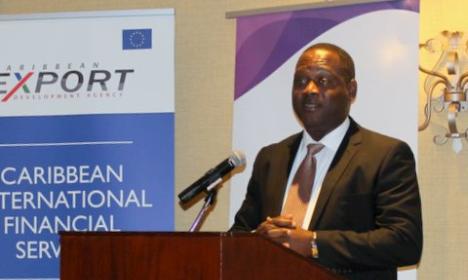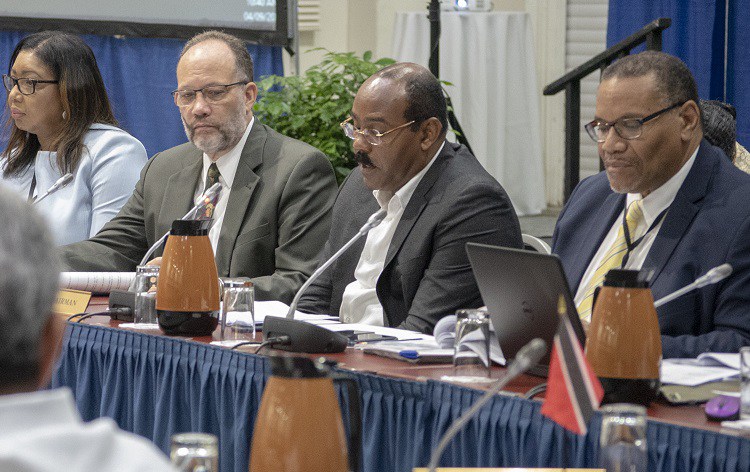The Caribbean region has to take ownership of regulatory issues affecting the international financial services sector. Stakeholders in the sector must start using their high level of expertise and the Diaspora community with their vast international connections to lobby and convince international regulatory institutions of the importance of the sector for the regional economies. To change the focus from reactive to proactive, a regional secretariat should be established that advocates and formulates policies for the region.
This was the main “takeaway” of the workshop ‘Caribbean Banking and the Caribbean International Financial Services Sector’ which was held in Curacao on September 30-October 1, 2015 by the Caribbean Export Development Agency (Caribbean Export) in conjunction with Caribbean-Central American Action (CCAA). The workshop acted as a precursor to the Global Forum of the Organization for Economic Cooperation and Development (OECD), scheduled to take place in Bridgetown, Barbados on October 29-30, 2015.
“We usually sit and wait for others to make the decisions for us,” said Donville Inniss, minister of industry, international business, commerce and small business development of Barbados. “We only answer when we are asked a question, and even then we answer late.”
Inniss compared the rules set by international establishments to a new form of neo-colonialism.
He stated, “Each of these institutions has its own set of rules and we are constantly trying to play by them so that we don’t lose our correspondent banking relationships, or don’t get blacklisted. We need to change this. We have to build regional partnerships and identify issues and solutions long before international entities ask us any questions. We must start sending the message that we are knowledgeable, responsible and engaged.”
In his contribution, Wayne Shah, board member of Florida International Bankers Association (FIBA) agreed that the Caribbean must get more engaged and be more present. Although he stressed that the Caribbean countries should play by the rules, he also pointed to the negative economic impact new regulations sometimes have on the region.
“The rising costs of compliance are forcing the region’s international financial services sector out of business,” Shah said. “It leads to marginalization of small jurisdictions; a disruption of remittance flows; and an increase in the cost of doing business in small economies.”
Furthermore, Shah said, “Loss of trade financing arrangements and remittances could lead to a situation where the use of unregulated channels would be inevitable. The Caribbean needs to work on a coordinated response. The Caribbean financial services sector should partner with countries in Latin America and other regions to get the mainstream media in the US to cover their plight in its true light.”
According to Paul Byles, CEO of First Regents Bank and Trust of the Cayman Islands, the mainstream media play an important role in how international institutions react to the Caribbean.
“The media tenaciously portray our region as whitewashing havens. We see it constantly in movies and on TV. This persistent negative view blurs the vision of international financial institutions when they are dealing with us. They don’t see an individual country; they see the corruption of the region that the media perpetuate,” he said.
Byles added, “Through the proposed regional secretariat the Caribbean countries should work together to change this perception.”
Furthermore he put forward that “the financial sector should keep doing what it always has done best: develop high level innovative products; expand the range of services to withstand shocks; and keep on stressing the political and fiscal stability of the region.”
During the afternoon sessions the impact of compliance and technology on the remittance industry were discussed.
Georgette Jean Louis, member of the board of the Banque de la République d’Haiti, explained that remittances in Haiti have grown from $1.4 billion in 2011 to $1.8 billion in 2014.
“Remittances are a key source of revenue and development funds for the Haitian economy,” Jean Louis said. “If the remittances agencies should disappear in Haiti due to more regulation and rising costs, remote areas of the country will face severe hardships. Most of these areas don’t have regular banks and the cost of entry for new banks would be impossible to bridge. As a result, several regions would descend into unknown levels of poverty.”
Michelle Allen, CEO of Grace Kennedy Money Services/Western Union, concurred that the impact on whole economies of remittances services disappearing would be enormous.
“On an international level we just see de-banking as a consolidation of banks and services,” Allen said. “But on local levels we are talking about an enormous pressure on social projects and a disruption of total communities. Crime rates would rise. A new movement of the Caribbean Diaspora, fueled by poverty, to other countries in the region and to the USA, would be an unintended consequence. This situation requires immediate action.”
According to Jerry Butler of the Inter-American Development Bank (IDB), the Caribbean Diaspora that established itself outside of the region in earlier decades could now be seen as a possible solution for addressing the issues the International Financial Sector in the Caribbean is facing.
“We don’t tap into this group often enough,” Butler said. “We all know people in this group and we are conscious that they operate at very senior levels in institutions and organizations that matter, but we do not include them often enough in our lobby for our cause.”
Butler said that the narrow ties individuals of this group have maintained with their home countries have kept them up to date with the developments in the region.
“It should be easy to get them on board,” he suggested.
Pamela Coke Hamilton, executive director of Caribbean Export, didn’t completely agree with Butler.
“Lobbying without the numbers or without a vision for the region will not get us on their agenda,” Coke Hamilton said. “That is why we should work on a proactive regional secretariat that would formulate policies and positions for the region based on evidenced based research amongst member states.”
The regional secretariat would function as a rapid response mechanism to address issues of a regulatory nature as well as other matters affecting the region’s financial sector. Coke Hamilton’s proposal to launch a regional secretariat was accepted as the viable way forward by the participants of the workshop.
originally posted at http://www.caribbeannewsnow.com






